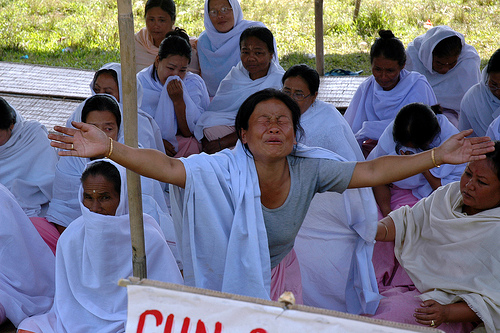SOUTH ASIA: Widows of Conflict in Manipur Survive Against the Odds

It's perhaps the only market in the world where all the vendors are women. Ima Keithal in Manipur's capital of Imphal (in the north eastern region of India on the border of Myanmar/Burma) is a tourists' paradise where women, sell everything from vegetables to beautiful hand spun shawls. But there's a bitter behind-the-scenes story here.
Manipur's women have a history of demonstrating their strength and independence – but even the tough resilience of India's north-eastern people has been sorely tested by the region's recent history, dominated since the 1960′s by a messy, multi-sided conflict. Human rights Watch estimates that the region has lost at least 20,000 lives over the last half a century.
Manipur's messy conflict
Indian army and paramilitary forces are fighting about 30 different insurgent groups, and the imposition of the reviled Armed Forces Special Forces Powers Act means that government, army and police can, with almost total impunity, arrest or even kill anyone suspected of being an insurgent. The region is awash with weapons, and violent crime has become a regular occurrence. Civilians are inevitably the greatest casualties. Even today, two or three people, mostly men, die every day in Manipur, leaving behind thousands of “conflict widows”.
Conflict widows
Memoria Chingsubam is just 23 and poorly educated, and she's struggling to bring up her six year old son alone. She remembers the day her husband was killed four years ago. She found out about his murder when she saw his corpse on the television news. His killers were never found, despite the fact that Memoria urged the police to investigate. She has never received any compensation, and survives now on the paltry 15 euros a month she earns from weaving shawls at home.
“300 widows are born every year in Manipur“, says activist Binalashmi Nepramin. She helped set up the Manipur Gun Survivors Network, which offers small loans to women like Memoria to set up micro enterprises. They have 125 women on their books at the moment, and of that number only three have ever received any kind of compensation for the death of their husbands. So the organization has also set up a legal team to help these women with the kinds of situations they're hardly equipped to deal with on their own. “Even for a widows pension, you have to pay a bribe” says Nepram.”
When Sana saw her husband's corpse she say “heavy marks of torture.” She asserts that he was just a businessman but police claim they shot him because he was an insurgent. She filed a case but was so intimidated that she didn't turn up in court when the case was being heard – a common phenomenon where ordinary civilians with no money or protection, are left vulnerable to violence that could come from any direction.
Kill for promotion
Basantakumarr Warappa is an activist with Human Rights Alert. He says that the only way a lower rank officer can get a promotion is by showing “how much activity” he is involved in – which can be interpreted as an incentive to kill “militants”. It's a set-up open for abuse, and according to the present culture of impunity, almost impossible to stem.
Naked protests
But the women of Manipur have a history of defiance. They staged successful agitations in the war against the British, and in 2004, protesting against the frequent rapes committed by Indian soldiers, a group of women – young and old – paraded naked on the streets of Imphal. The news footage and pictures of 100 naked women bearing signs “Indian Army rape us” sent shock waves around India.
“We have been made to be scared so much that we don't get scared anymore”, says Binalakshmi Nepram. “Women have been told to shut up, but it is mainly us, the women who have to pick up life again for us and our children. And they can't subdue us anymore so we fight back and we will continue to fight back.”
PeaceWomen.org is a project of the Women's International League of Peace and Freedom, United Nations Office.
Fair Use Notice: This page contains copyrighted material the use of which has not been specifically authorized by the copyright owner.
PeaceWomen.org distributes this material without profit to those who have expressed a prior interest in receiving the included information for research and educational purposes.
We believe this constitutes a fair use of any such copyrighted material as provided for in 17 U.S.C § 107.
